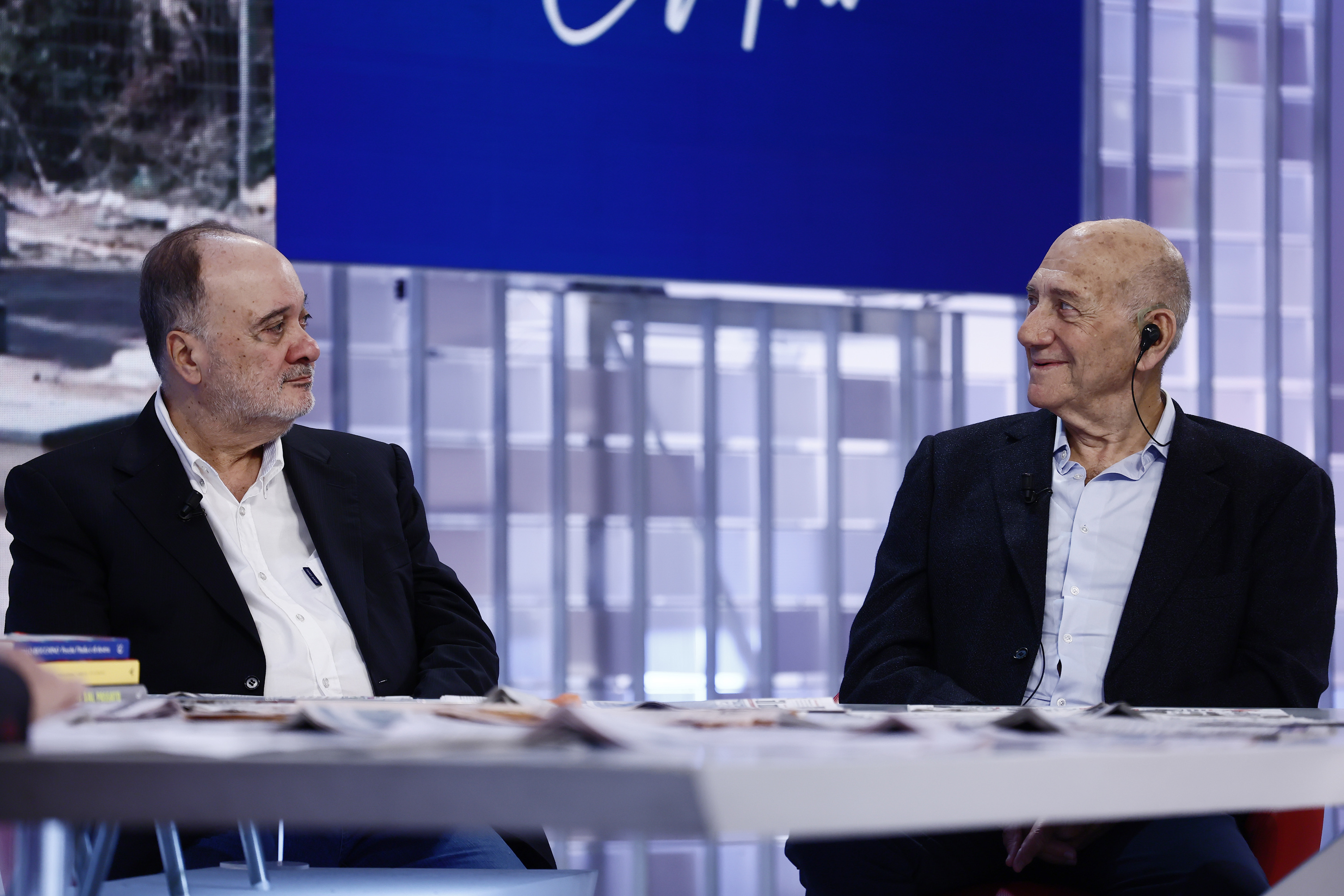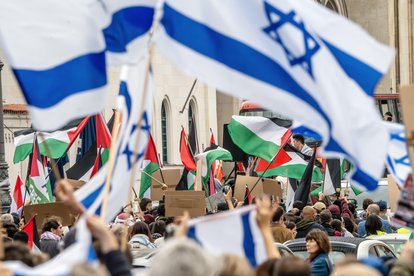Middle East conflict
New Palestinian leadership is on the rise

Ehud Olmert, former Israeli Prime Minister and Nasser Al-Kidwa, former Palestinian Foreign Affairs Minister speak of a two-state solution that brings security, freedom and dignity for all Palestinians and Israelis.
© picture alliance / ZUMAPRESS.com | Cecilia FabianoLast month, Palestinian President Mahmoud Abbas attended the annual United Nations General Assembly (UNGA) for the 20th time! At the age of 89, he gave his usual speech, blaming the whole world but never assuming any responsibility for all that his people have endured during his 20 years of rule.
During the last 12 months, 70% of the Gaza strip has been turned to ground zero and more than 40,000 Gazans have lost their lives, including more than 18,000 children and yet the president of the Palestinian people had time to visit New York and address the world leaders while not finding one opportunity to address his terrified people.
I was born 52 years ago in the old city of Jerusalem, and was 14 years old when the first intifada hit the streets of my city. That is when together with hundreds of thousands of Palestinian children, the conflict stripped away our innocence and reshaped our world, it stole our childhood and became our identity and it did so for both sides of the divide. I threw stones during the first Intifada and at the age of 15, I was sentenced to 5 years in an Israeli prison. It was the hardest moment of my life - but also the most important. Behind bars, I discovered patience, resilience and the power of understanding. I learned the language of my “enemy.” After 35 years of dialogue, I know now: peace starts with seeing through each other's eyes. After meeting “the enemy”, getting to know them, I had a change of mind and heart. I have been speaking to Israelis for 35 years, and I understand the Israeli mind set probably as well as that of any Palestinian.
Here is what I have learnt: You cannot pressure Israelis – pressure only makes them more stubborn. The same goes for most people. What you can do is persuade Israelis, allay their fears, and find common ground. I have found that Israelis, other than the fringe extremists, are open to any reasonable proposition and receptive to open-hearted dialogue. Here I ask myself why do we need to go to Washington DC or hold fancy speeches at the UN? The only people we need to speak to are our neighbours. We do not need 150 countries to recognize the State of Palestine, we only need one – Israel. That is the only way to bridge the divide. Talking to them directly.
Abbas was elected in 2005 to serve for four years. He has served for nearly 20 years, with no elections held since. This is why we feel he has betrayed the Palestinian people. He has failed to deliver democracy, failed to keep us safe, failed to manage a viable economy and failed to ensure we can live a dignified life. Sometimes it seems all he has given us is corruption, misrule and an embarrassing speech once a year at the UN General Assembly in New York. It is no surprise that 90% of Palestinians want him to resign.
Abbas’ first big failure was losing the legislative elections in 2006 to Hamas. Then, losing the Gaza strip and allowing Hamas to establish their regime. Divisions in the Fatah movement have grown over his increasing control of the Palestinian decision-making process. These differences came to the surface in the run-up to the elections scheduled to be held in 2021. Elections Abbas ultimately cancelled after Fatah split into three lists aligned with different leaders: one with Abbas, one with Mohammad Dahlan and the third with Nasser Al-Kidwa. Had he allowed elections to take place, it would have led to a different trajectory in the Palestinian political arena.
The continuation of Mahmoud Abbas’ regime and his policy of tyranny and oppression has not and will not be the way to achieve progress in the lives of the Palestinians nor to achieve any positive development between Palestinians and Israelis. There is urgent need for Palestinian society to move towards moderation and pragmatism with the goal of consolidating democratic norms within the Palestinian political system and civil society.

Samer Sinijlawi: "We do not need 150 countries to recognize the State of Palestine, we only need one – Israel. That is the only way to bridge the divide. Talking to them directly."
© picture alliance / Wolfgang Maria Weber | Wolfgang Maria WeberThe development, moderation and openness of a future Palestinian society inevitably requires the establishment of transparency in the Palestinian political system. Not resorting to deception, lying, and evasion. Palestinians must experience the unleashing of their freedoms and must have access to the democratic political system; instead of the current policy of exclusion, deportation, arrests, and intimidation that the Palestinian security services resort to against anyone who dares to criticize Abbas’ regime. A new Palestinian leadership must push forward the spirit of hope among the Palestinians rather than drowning them in fear. This political system must be built on institutions, not on the glory of individuals, and this system must be based on justice and rejection of violence.
Abbas’ leadership continues losing its moral conviction and authority, while growing increasingly detached from what Palestinians need and want. For us, Palestinians, revitalization of the PA will have legitimacy only if there are fundamental changes in the authority’s structure — and that includes changing the leadership.
During the last weeks, it was my great honour and privilege to participate in meetings and witness the drafting of a workable proposal by former Israeli Prime Minister Ehud Olmert and former Palestinian Foreign Affairs Minister Nasser Al-Kidwa. Together, Olmert and Al-Kidwa drafted a plan that is gaining momentum. It offers a way forward for Gaza—including a transitional governmental structure (Gaza Transitional Commissioners Council) amenable to all parties. Beyond that, it offers a workable two-state solution delivering security, freedom and dignity for all Palestinians and Israelis. If a former Likud leader and a Fatah leader can come together with a plan to end this war and create a roadmap to peace and coexistence, then so can every Israeli and Palestinian, along with our allies around the world. This is a declaration of hope—a realistic vision for a better future, even in these dark times.
A new Palestinian leadership must invest time and resources in rebuilding trust and confidence with the Israeli political elites. A new leadership on both the Palestinian and Israeli side would need to begin a rapid top-down trust building process that might include revising both educational systems and media policies towards eliminating hatred and incitement and advocating for tolerance and coexistence. It starts by developing new security arrangements in Gaza that includes inviting an Arab transitional force with the task of securing Gaza’s borders and disarming those who wish to threaten Palestinians or Israelis. For this vision to work, the Arab countries, the international community, donor countries and Israel would have to recognize this governing body.
We need to start the process of rebirthing the Palestinian people, de-radicalizing our society and pursuing moderation—though we must combat hatred and incitement on both sides. We need to teach our children that the Israelis are not the problem. And Israelis need to teach their children that the Palestinians are not the problem. We need to start seeing each other as the solution to our problem. That is the exit ramp from this conflict. That is the path to co-existence.
Today every Palestinian wakes up believing today will be worse than yesterday. Every Israeli believes today will be less secure than yesterday. This cycle will not end until Palestinians prioritize Israeli security and Israelis prioritize Palestinian freedom and dignity, not as charity, but for their own future. It is time for us Palestinians to adapt to a strategy based on guaranteeing security to Israelis, and for Israelis to adapt to a strategy based on guaranteeing human dignity, respect and national aspirations to Palestinians, not as favours to each other but out of our own national interest. Only when both sides realize their fates are intertwined will this conflict finally end.
The author is a Palestinian activist and political commentator from East Jerusalem, one of the Fatah opponents of Palestinian President Mahmoud Abbas, and the chairman of the Jerusalem Development Fund.
X and Instagram-Account of Samer Sinijlawi.

